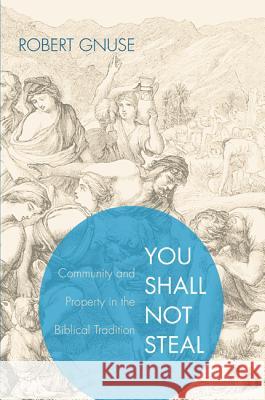You Shall Not Steal » książka
You Shall Not Steal
ISBN-13: 9781610975803 / Angielski / Miękka / 2011 / 174 str.
The biblical injunction not to steal is often used to defend the notion of inviolable private property and the right to accumulate great wealth. The author demonstrates that this is a misuse of the biblical text and that, on the contrary, the commandments purpose was to guarantee everyones right to basic necessities of life.""This book purports to be the exposition of a single commandment. It is that. But beyond that, it is a programmatic statement about how the Bible speaks about wealth, power, community, and responsibility. Without engaging in ideological extremity, the author shows how serious social criticism can illuminate scripture and rescue us from distortions of the text because of our own economic commitments. The outcome of the study is to show how the prohibition of stealing is not a defense of private property (as commonly read) but a warning against property management that diminishes community: that is, the text turns against our preferred reading. ""It takes no great sensitivity to see that this subject and this treatment of it have urgency for us, even though the author makes no special effort at relevance. As Gnuse observes, The Israelite ethos was formed in the crucible of slavery of Egypt and of conflict in Canaan. Our interpretive task is to see how this text continues to have social energy in a matrix of affluence and greed. ""The book is enhanced by a full bibliography and a brief extension of Old Testament trajectories into church tradition."" Walter Brueggemann, Eden Theological Seminary ""You Shall Not Steal is a thorough and discerning analysis of the decalogue commandment against stealing. Gnuse shows its radical character in the ancient Near Eastern world, traces its implications in later biblical literature and thought, and has sound observations about the continuing import of this commandment on the contemporary scene."" Walter Harrelson, The Divinity School, Vanderbilt University ""This book raises the central issue of biblical justice for all Christians. For the western mind justice is perceived as incompatible with compassion. But biblical justice overturns this notion; it is both fairness and compassion. Gnuses efforts to develop the biblical understanding of justice are bound to prove fruitful for all concerned Christians."" Patrick D. Sheedy, JD, Director of Social Action, Social Welfare Department, Minnesota Catholic ConferenceRobert Gnuse is the James C. Carter, SJ/Bank One Distinguished Professor of the Humanities in the Religious Studies Department at Loyola University New Orleans. He is the author of 12 books and approximately 80 articles in the field of biblical studies.











